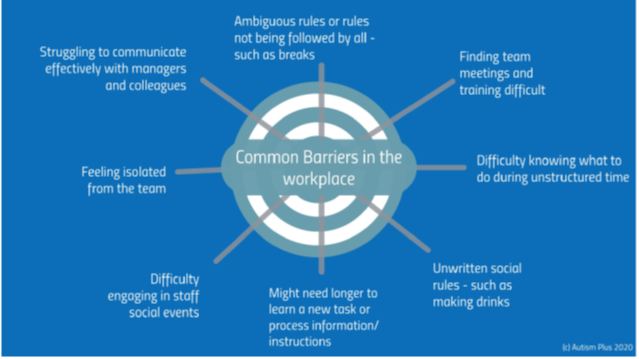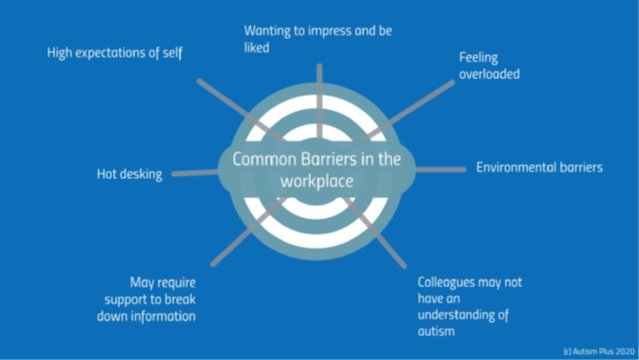Insights
21 – 27 March 2022 is Celebrating Neurodiversity Week.
Neurodiversity Celebration Week is a week-long event designed to celebrate all the neurodiverse people in our lives, including your employees, and the strengths they have. It is also a time to consider what employers are doing their best support the neurodiverse people they live and work with.
It is estimated that 1 in 7 people in the UK are neurodiverse, with 90% of disabilities being invisible. Neurodiversity it is an integral part of human diversity and is an invaluable part of the workplace. Well-known organisations such as Microsoft, Google and Goldman Sachs actively recruit neurodiverse individuals.
1. What is neurodiversity?
Neurodiversity encompasses a wide range of neurological differences. Although considered to be a relatively new term, it is thought to have been coined by autism activist Judy Singer back in the 1990s in a bid to move away from the ’medical’ view of autism and the idea it is something that should be “cured”.
The term “neurodiversity” is used to describe the 20% of people who have:
- Dyslexia
- Dyscalculia
- ADHD
- Autism
- Tourette’s Syndrome
- Dyspraxia
- Dysgraphia
2. What common challenges/barriers can neurodiverse people face at work?
a. Social interaction
- They may struggle to understand ambiguous communication or understand emotions
- They may find it difficult to meet new people
- They may find it hard to start and end conversations
- Be worried by new or intimidating situations
- They may struggle decipher local/regional communication differences
- They may use and understand only very literal communication
- They may not fully appreciate when something is said in jest
b. Hidden communication challenges they may face and not understand/appreciate include:
- Body language
- Facial expressions and reactions
- Eye contact
- Gestures during conversations
- Proximity


3. How to support and manage a neurodiverse employee?
Help them understand social rules in the workplace. For example:
- Make clear what is expected of them
- Do not assume they will be able to learn just from observing others
- Explain what is expected of them in unstructured times at work
- Help them understand when to join in
Making and building relationships/friendships
- Use literal communication in social relations
- Enlist the support of peers
- Provide a ‘buddy system’
When to refer to others and where boundaries lie
- It is important to make it clear what your role as an employer is and where it ends
- Speak about local support networks and signpost/put them in touch where wanted/needed
- Ensure the individual is involved in this process
In summary, support strategies are:
- Ensure they know what to do during unstructured times
- Break down instructions
- Understand that learning new tasks can take longer
- Multitasking can be difficult so allow them to complete one task before giving them another
- Notebooks or cards can be useful or ensure the individual knows where to find the next task
- Understand some communication roles may be difficult e.g., using the telephone
What help can you get as an employer?
There is the Access to Work Scheme.
Essentially, it is a:
- Government scheme to facilitate support in the workplace and job retention for individuals with disability or health needs
- Provides funding to make workplace adjustments (physical, equipment, software, training or support workers)
· Funding depends on:
- How long employee has worked with organisation
- Extent of needs of individual
- Size of company
- Type of support required
What are the potential impacts from a legal perspective?
a. Under the Equality Act 2010:
- The definition of disability: An impairment which has a long term and substantial adverse effect on normal day to day activities
- ‘Impairment’ can include sensory impairments, impairments with fluctuating or recurring effects, and can be “developmental, such as autistic spectrum disorders…dyslexia and dyspraxia…learning disabilities…”
- Day to day activities is widely widely defined
- The main question is normally the extent to which the ability to carry out activities is impaired by the disabilities
- There has been an increase in the number of employment tribunal claims involving neurodiversity – so tribunals are becoming more aware of neurodiversity.
b. Can neurodiverse conditions amount to a disability?
- In the case of XX v UKBA (2012), an immigration officer with dyslexia and dyspraxia was found not to meet the legal test of disability but may have been disabled when he became depressed
- In Elliott v Dorset County Council (April 2021), the claimant found it difficult to accept new time management rules and to communicate with his manager. The matter was referred to the Community Adult Asperger Service during a disciplinary investigation and the employee was diagnosed with ASD and Asperger’s Syndrome
- You have to consider if the employee is affected to a more than minor or trivial extent in carrying out day to day activities (which may include work activities) as a result of the impairment in comparison to what the situation would be if the employee did not have the impairment
- A neurodiverse employee’s coping strategies do not necessarily mean someone is not disabled
c. What reasonable adjustments can an employer make?
- In the Elliott case, it was said that the employer should, “…clarify expectations of the job; provide clear, structured training and monitoring; ensure the work environment is well structured; regularly review performance; provide sensitive but direct feedback; provide reassurance in stressful situations; ask about sensory distractions; and help other staff to be more aware”
- Be flexible
- Consult with the individual
- Do seek advice from your in-house HR team or external HR advisors.






